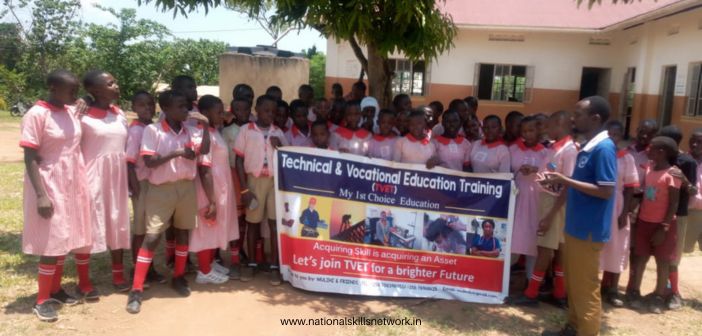
The Technical and Vocational Education and Training (TVET) ecosystem in Uganda is slowly picking up and expanding. The government has also taken several initiatives like framing the TVET Policy to give the much-needed impetus to the evolving TVET ecosystem in the country.
In Uganda, the TVET system is under the authority of the Ministry of Education and Sports (MoES), which is responsible for programme implementation and monitoring, including procedures for planning, budgeting and annual reviews.
To understand and learn more about the TVET ecosystem in Uganda, we conversed with Mr. Mulihi Bumali, Manager – National Careers Week Uganda.
Mr. Mulihi Bumali is the Team Leader of Pamoja careers services of National Careers Week Uganda. He is a professional technical teacher education specialist from Kyambogo University and Civil Engineering Technician from Uganda Technical College, Bushenyi.
Over the last decade, he has championed access to information on careers education, advice and guidance. His professional interests focus on the accessibility of career education services and he remains a passionate supporter of initiatives that encourage free access to career education across the globe.
Q: How does the TVET system work in Uganda?
A: The TVET policy 2019 is our current guiding policy and it’s aimed at the creation of a demand-led TVET system. The framework covers qualification and training curricula aligned towards the creation of the same and focuses on decentralization of TVET delivery, sustainable partnerships, and relevant and responsive TVET to match the needs of the 21st century.
The students and job seekers welcomed the framework since it’s tailored and inclusive to suit individual needs for example courses have been modularized and recognized.

Q: Is there any similarity between the TVET ecosystem in Uganda and India?
A: In Uganda students from general education can join formal TVET as a route to further education. In common, Uganda and India TVET systems well position Sector Skill Councils to accelerate the realization of demand-led TVET.
Similarly, governments in both commonwealth countries lead in both policy and financing aspects of TVET. Just like in India, private training providers are allowed to operate and their umbrella is Uganda’s private vocational training institutions. Uganda TVET system just like others worldwide has formal, and non-formal/ informal training.
Q: What are some of the challenges or issues with the TVET system in Uganda?
A: There are several challenges in implementing a successful TVET system in Uganda. Some of them are –
- The negative social image of TVET is still a big challenge although the perception is gradually improving as evidenced in enrolment numbers
- Limited capacity to offer new TVET courses
- Most of our TVET institutions still teach only traditional courses and have not incorporated the latest technology courses. For example, drone technology isn’t part of the curricula, hence missing out on the potential of the sector
- TVET institutions both public and private institutions are both understaffed due to financial constraints which partly affects the quality of TVET delivery in Uganda.
- Insufficient TVET funding – The TVET share of the education sector budget is still insufficient to enable smooth operations in TVET since the operational and arrangement cost is high to enable quality hands-on training since funding is mainly from budgeting allocations and school fees from parents.
Q: What are some of the prominent organizations or institutions responsible for implementing TVET in Uganda?
- The Directorate of Industrial Training (DIT) is mandated to develop occupational standards to regulate work-based training schemes, apply and expand the Uganda vocational qualification as per BTVET all 2008 with the industrial training council as the policy-making organ and advisory body to the minister of education.
- Uganda Business and Technical Examination Board (UBTEB) is mandated to streamline, regulate, coordinate and conduct credible national examinations and award certificates and diplomas in business technical and vocational specialized education/training in Uganda.
- Uganda Nurses and Midwives Examination Board is also part of the assessment bodies dealing with health education.
- Private Sector Foundation Uganda (PSFU) – Since 1995 the foundation is home to the private sector and has over the years represented views of the sector to the government and supported TVET’s progress through its member association.
The TVET policy implementation secretariat is working tirelessly to ensure the seamless and continuous realization of the 2019 TVET policy. The TVET policy will introduce new organizations in our TVET landscape like the TVET council.
Training institutions like private technical and vocational training institutions, public technical and vocational community polytechnics, institutes and colleges.
It may also interest you to read –Bangladesh’s Skill Ecosystem and the Road to a Skilled Nation
Q: How is the industry collaboration with academia in Uganda? What are some of the popular industry-aligned courses?
A: The industry collaboration continues to grow strong through the active participation of the Private Sector Foundation Uganda in TVET matters. In addition, the Sector Skill Councils introduced by the new policy are working tirelessly to address uncoordinated working relationships between academia and industry.
Recognition of work-based learning in Uganda is a clear indication of a smooth collaboration between the industry and academia. Popular industry-aligned courses are in tourism and hospitality, agriculture, construction, manufacturing, and oil and gas.
Q: What are some of the initiatives you have taken to promote skilling and work-integrated education? How was the response?
A: Since 2011, I have been running a program called “TVET is my 1st choice of education”. This is mainly geared towards changing the social image of TVET in the community. A blended approach has been implemented for both online and in-person engagement with the community.
TVET and careers information centre
To share reliable information on TVET, l have been running a small information centre where the public can contact and consult on TVET and career matters at no cost. This continues to impact and better lives and livelihoods.
National Careers Week and Green Careers Week celebrations
The robust and solid partnership of National Careers Week UK and Pamoja Careers Service has enabled us to organize National Careers Week and Green Careers Week celebrations in Uganda as we inform our communities about careers and double the transition to green and digital.
The provision of follow-up guidance and counselling is done to guide our communities to make informed decisions on the next educational or career pathway. With all these activities and initiatives, over 5000 people have directly benefited.
In the next 5 years, we plan to upscale our activities to cover and impact a wider community by adding new services like scholarships, interest-free education loans, and digitalization of our information centre, among others.













